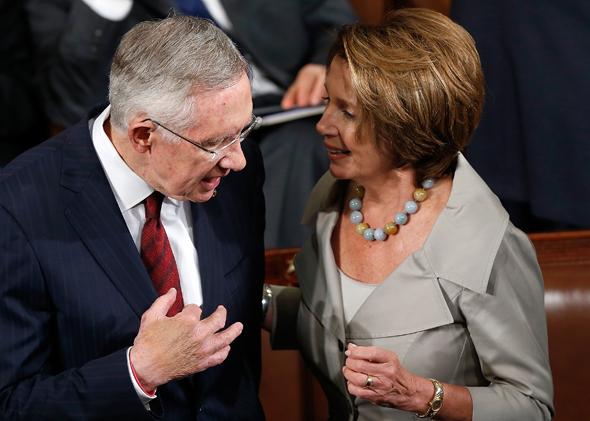Democrats are still reeling from the Great Whupping of 2014, trying to orient themselves for the next two years of Republican control in Congress. The recurring question, even now, is: What happened? Unemployment is down, and Republicans are unpopular. How did Democrats lose so badly?
The latest answer comes from National Journal’s Charlie Cook, who blames the drubbing on a series of bad choices from Democrats and the president, stretching back to the beginning of the present administration. “In mid-summer 2009, polls universally showed that Americans wanted the president, along with the overwhelmingly Democratic Congress, to focus on the economy and job creation,” he writes. “Instead, in its infinite wisdom, Congress chose to focus almost exclusively and obsessively on health care reform.”
Cook grants that health care reform was a “worthy objective,” but he sees the decision as a mistake. “Voters saw little action that would have turned the economy around and created jobs for many working- and middle-class Americans. Their struggle continues to this day, and it cost Democrats their Senate majority last week.”
There’s no doubt that economic anxiety drove last Tuesday’s results. “People are deeply suspicious that government can deliver on these problems,” says Democratic pollster Mark Mellman in a conversation with Greg Sargent of the Washington Post. “And they are not wrong. We’ve been promising that government can be a tool to improve people’s economic situation for decades, and by and large, it hasn’t happened.”
But the other idea in Cook’s diagnosis—that a “focus” on the economy would have saved Democratic prospects—is ludicrous. Substantively, another stimulus wasn’t in the cards in the summer of 2009, when Democrats moved to climate change and health care reform. Indeed, the first stimulus—the American Recovery and Reinvestment Act—was a huge political undertaking that strained the Democratic coalition, from disputes between liberals and moderates on the size of the stimulus to the fight to get it through the Senate, which almost failed. To build unity and break a GOP filibuster, supporters trimmed the bill for the most conservative Democrats—who feared political attacks at home—and did the same for the three Republicans who joined the push, Sens. Arlen Specter of Pennsylvania and Olympia Snowe and Susan Collins of Maine.
The party was exhausted. Blue-dog Democrats were loath to spend more on stimulus, and the administration didn’t see the need—at $787 billion, they thought the law was big enough to do the job. It would be a year before the White House saw the need for another stimulus package—and given the backlash to the ARRA and other efforts to save the economy—it’s not clear it could have passed, even if Democrats put health care and climate on the sidelines.
Of course, that doesn’t mean Democrats couldn’t have talked about the economy more. Obama could have kept a rhetorical focus on economic growth even as he went for other agenda items. And likewise, for this year, Democrats could have used more populist rhetoric to describe their agenda and their accomplishments.
But there’s no evidence this would have changed outcomes in either 2010 or 2014. In part because of the structure of both elections—red-state contests in electorates that favor Republicans—and in part because of the material reality for ordinary voters. Put another way, talking about the economy and using populist language doesn’t change the reality of mass foreclosures and stagnant wages. “The fact remains that incomes for most Americans aren’t growing very fast and haven’t been for years,” writes David Leonhardt for the New York Times. “Median inflation-adjusted income last year was still $2,100 lower than when President Obama took office in 2009—and $3,600 lower than when President George W. Bush took office in 2001.”
Democrats, he says, lack a short-term plan to help the middle class. And the ideas they have—like infrastructure spending, raising the minimum wage, and increasing education—are either indirect or take years to come to fruition.
According to Cook, there was a chance to do more in 2009. But it wasn’t a more public “focus” on the economy, which wouldn’t have helped anyone, even if it looked good; it was housing relief. As David Dayen notes for Salon, the administration could have pushed mass refinancing through Fannie Mae and Freddie Mac as another kind of economic stimulus. “This was one of the major fiscal policy tools available to the Administration that didn’t require additional spending,” he writes. “[T]he Federal Reserve had lowered interest rates, it was merely up to Fannie and Freddie to take advantage of it.”
A world where hundreds of thousands of Americans kept their homes because of Democrats is—potentially—one where Republicans don’t win waves in two consecutive midterm elections.
For now, a Republican-controlled Congress means Democrats will have an impossible time winning any legislation, much less moves to distribute the gains of our economic growth to ordinary people. But that doesn’t mean the party should sit on its hands. Now—as would-be presidential candidates build their platforms and portfolios—is the time to propose new ideas for ending wage stagnation. The time is right to propose something that lives on the edge of the possible, like a new flat Social Security benefit for all retirees or an expansion and reform of the Earned Income Tax Credit that includes middle-class families.
Both would boost incomes, and neither is far away from the mainstream of the Democratic Party. The only question is whether Democrats have the courage to stick their necks out for something new, something that gives voters a plan to support, or if they’ll just resign the conversation to Republicans and wonder why they keep losing.
